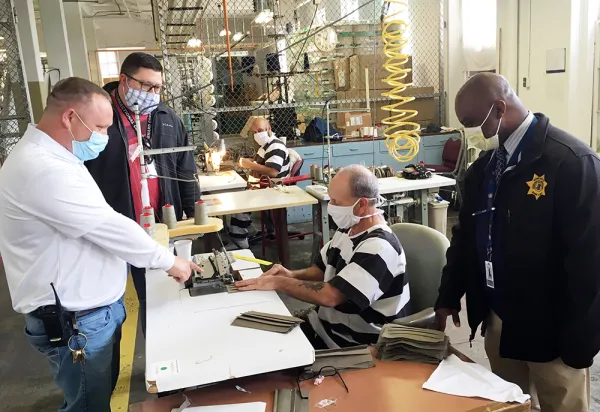Menard Correctional Center makes vitally needed PPE

The ICI crews at Menard make soap, cleaning supplies, brooms and mops. They also have a sewing shop where inmates make socks, pants and shirts—all for state use.
So, when the coronavirus crisis hit Illinois, Menard was poised to help.
“We had the man power, the will and all the machines to do everything needed to make personal protective equipment,” AFSCME Local 1175 President Dennis Young said (pictured in the sewing shop, second from left, along with ICI lead worker Michael Schnicker, far left, members of the sewing crew and Warden Anthony Wills, far right). “We got ahold of some material and the offenders started making masks. They are pumping out at least 500 a day.”

The crew has a system down, Young said. “One guy is cutting material into strips, one person is ironing the fold-over piece, one is sewing the edges down. There’s an assembly line of very skilled people.”
Life at Menard has changed drastically during the pandemic. Staff always have to wear masks, and so do offenders who are working closely with others or handling food. So far there hasn’t been a positive COVID-19 test.
The team of sewers are working long days to produce not only masks, but full gowns. Their work is benefiting Menard as well as other state institutions.
“These guys are making an effort to do the right thing and they are very reliable,” Young said. To apply to work in ICI, an offender must have minimal problems on their record and apply for a position. They are trained by program veterans and paid for their time.
“Sewing is a lost skill in some ways and this training will help the guys when they get out,” Young said. “And even now, a lot of the guys are supporting families at home with the money they make.”
